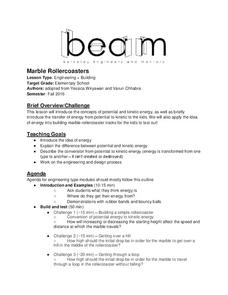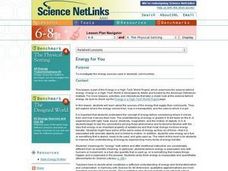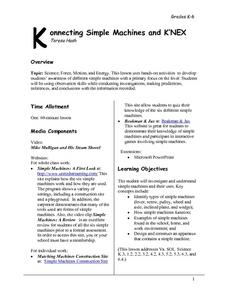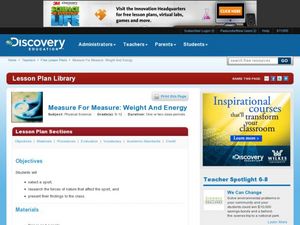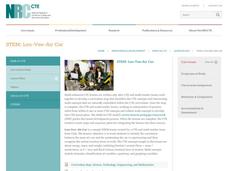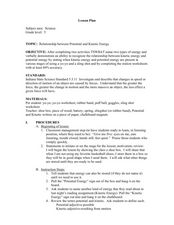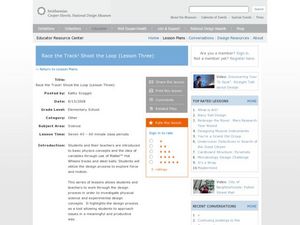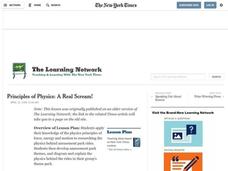Curated OER
Regents High School Examination - Physics 2010
Give every type of learner in your physics class an opportunity to demonstrate what they have learned throughout the year. From analyzing tables and graphs, to evaluating diagrams and solving problems, there is an outstanding variety of...
Curated OER
Introduction to Work
Fifth graders define work, force, and energy and calculate work done using a simple formula. They observe the teacher using an Equi-beam and identify the fulcrum, calculate different work problems, and participate in a class discussion.
LABScI
Kinematics: The Gravity Lab
Falling objects can be brutal if you don't protect your noodle! Scholars explore the motion of falling objects through measuring short intervals to determine if the distance traveled varies with time. Building off of this, scholars...
University of California
Marble Rollercoasters
Don't let your classes coast through school! Engage them in their learning as they build their own roller coasters to study potential and kinetic energy. Young scholars complete several challenges that require them to consider the...
Curated OER
Energy for You
Students investigate the energy sources used in student's communities. They explore where the energy comes from, how it is transported, and the uses to which it is put. They review the meanings of vocabulary renewable and newable resources.
Curated OER
Konnecting Simple Machines and K'Nex
Students study and identify different types of simple machines and how they work. They design a simple machine.
Curated OER
Motion
Sixth graders read about and study motion. They conduct a lab in which they calculate speed using track records at their school. They graph the results and then invite a guest speaker (an officer from the local police department) who...
Curated OER
Measure for Measure: Weight and Energy
High schoolers study the friction of a particular sport. In this weight and energy lesson students choose a sport and us the Internet to research it then present their findings to the class.
Curated OER
Characteristics of Energy
Students explore Earth science by completing energy worksheets in class. In this energy forms lesson, students identify and define a list of energy vocabulary terms and a K-W-L chart. Students view a matter video clip in class and...
National Research Center for Career and Technical Education
STEM: Lou-Vee Air Car
A comprehensive lesson on acceleration awaits your physicists and engineers! Two YouTube videos pique their interest, then sample F=ma problems are worked and graphed. The highlight of the lesson is the building of a Lou-Vee air car!...
Curated OER
Relationship between Potential and Kinetic Energy
Fifth graders explore the relationship between potential energy and kinetic energy. In this energy lesson, 5th graders examine objects and describe potential and kinetic energy of the objects. Students complete two worksheets.
Curated OER
Race the Track! Shoot the Loop
Students experiment with a steel ball and matchbox car to find the effects of force and motion. In this force and motion lesson plan, students assemble a track, conduct experiments and record on a shoot the loop worksheet. Students...
Curated OER
Where the Rubber Meets the Road
Eighth graders examine two different types of tires and the effects of different factors on the amount of force needed to overcome sliding friction such as when the vehicle tries to stop.
Curated OER
Principles of Physics: A Real Scream!
Students apply their knowledge of the physics principles of force, energy and motion to researching the physics behind amusement park rides.
Curated OER
Energy Conversion
Sixth graders study energy conversions. They watch a demonstration of a working engine and make a chart explaining the energy conversions taking place. They build a simple electric motor and research other types of electric generators.
Curated OER
Potential and Kinetic Energy
Sixth graders explore potential and kinetic energy. In this science lesson, 6th graders assume the role of a roller coaster engineer and design a roller coaster. Students use their knowledge of kinetic and potential energy to design a...
NASA
Measuring Dark Energy
You're only 10 minutes late? Do you know how much the universe has expanded in those 10 minutes? Scholars graph supernovae based on their redshift and see if the results verify Hubble's Law. If it does confirm it, the universe is...
Curated OER
Motions and Forces
Students explore motions, forces and magnetism. They investigate magnetism as a force and examine the construction of a magnet. Students examine the force that magnetism produces.
Curated OER
Force/Newton's Laws/Friction
Students describe how to recognize a force, define balanced and net forces, state Newton's first law of motion, explain why friction works, state Newton's second Law of Motion, and explain why the direction of force is important.
Curated OER
Forces and Acceleration Unit
Young scholars investigate that an unbalanced force, acting on an object, changes it speed or path of motion or both, and know that if the force always acts toward the same center as the object moves, the objects path may curve into an...
Curated OER
Laws of Motions
Seventh graders explore the Laws of Motion. They define friction and explain the concept of inertia. Students explain what happens when a force is exerted on an object that is in equilibrium. They state the second and third laws of motion.
Curated OER
May The Force Be With You
Eighth graders investigate Newton's Laws of Motion. They use the example of a roller coaster for illustration purposes. A force associated with a roller coaster is tested, data graphed, and a conclusion is drawn. They use excel in order...
Curated OER
Simple Harmonic Motion
Students explore the theory of simple harmonic motion (SHM) by performing hands-on, practical application experiments. In this harmonic motion instructional activity, students use strings of various lengths and bobs of different weights...
Curated OER
Skateboards, Rocket Balloons and Newton's Laws of Motion
Students investigate forces. In this laws of motion lesson, students visit the Glasgow Science Center or Techniquest to participate in activities related to the Newton's law of motion.



